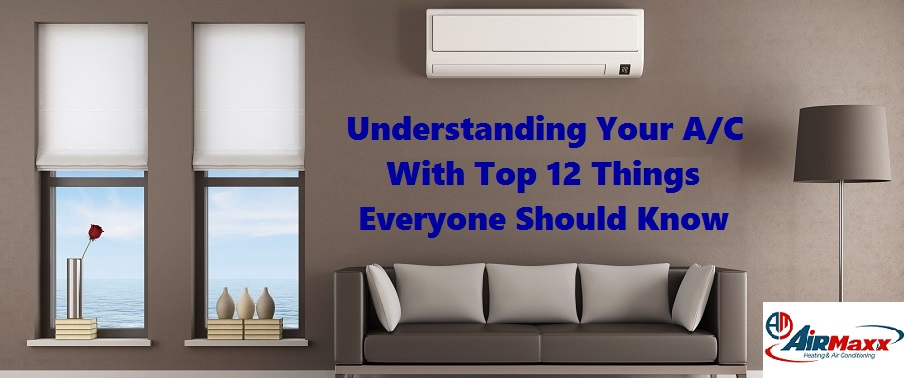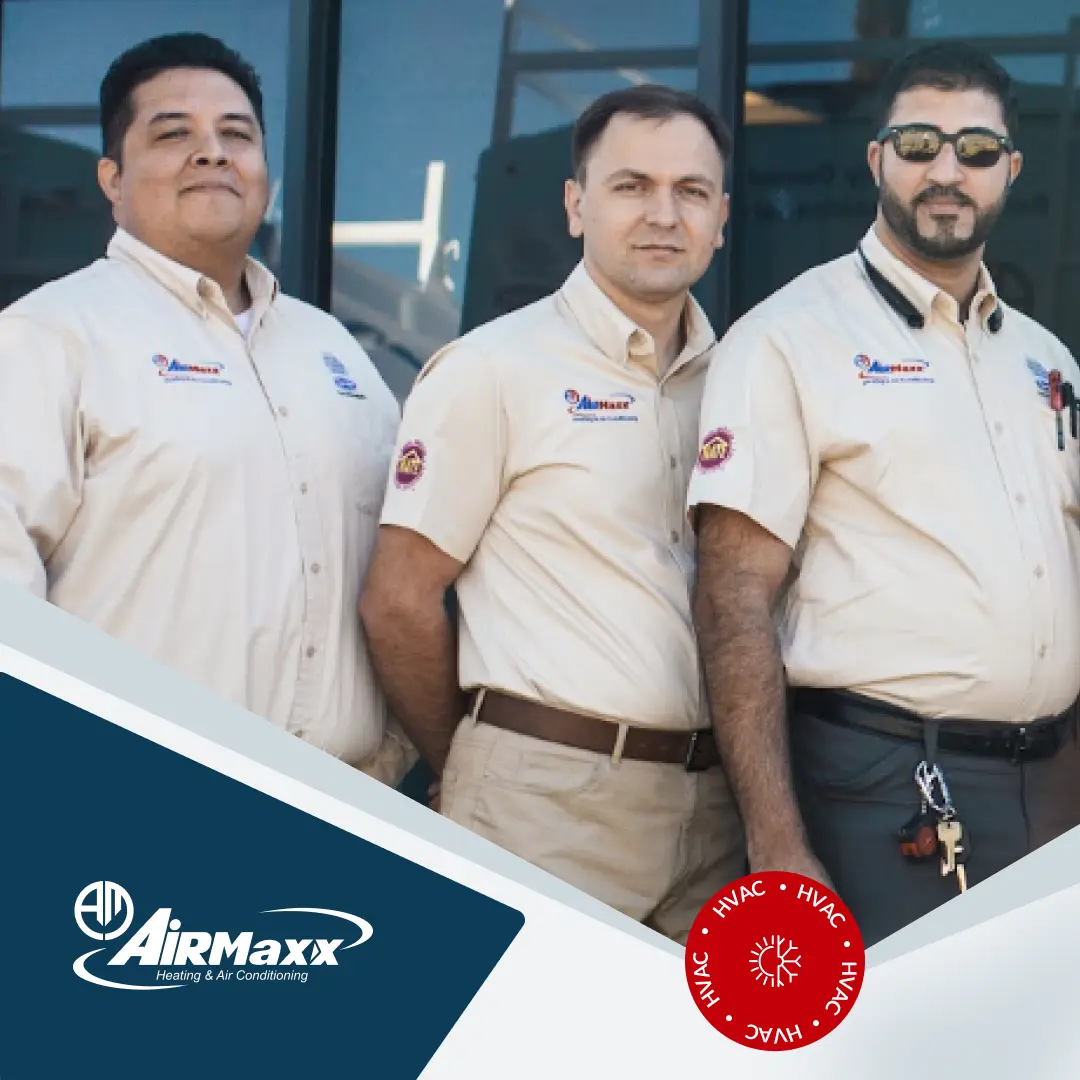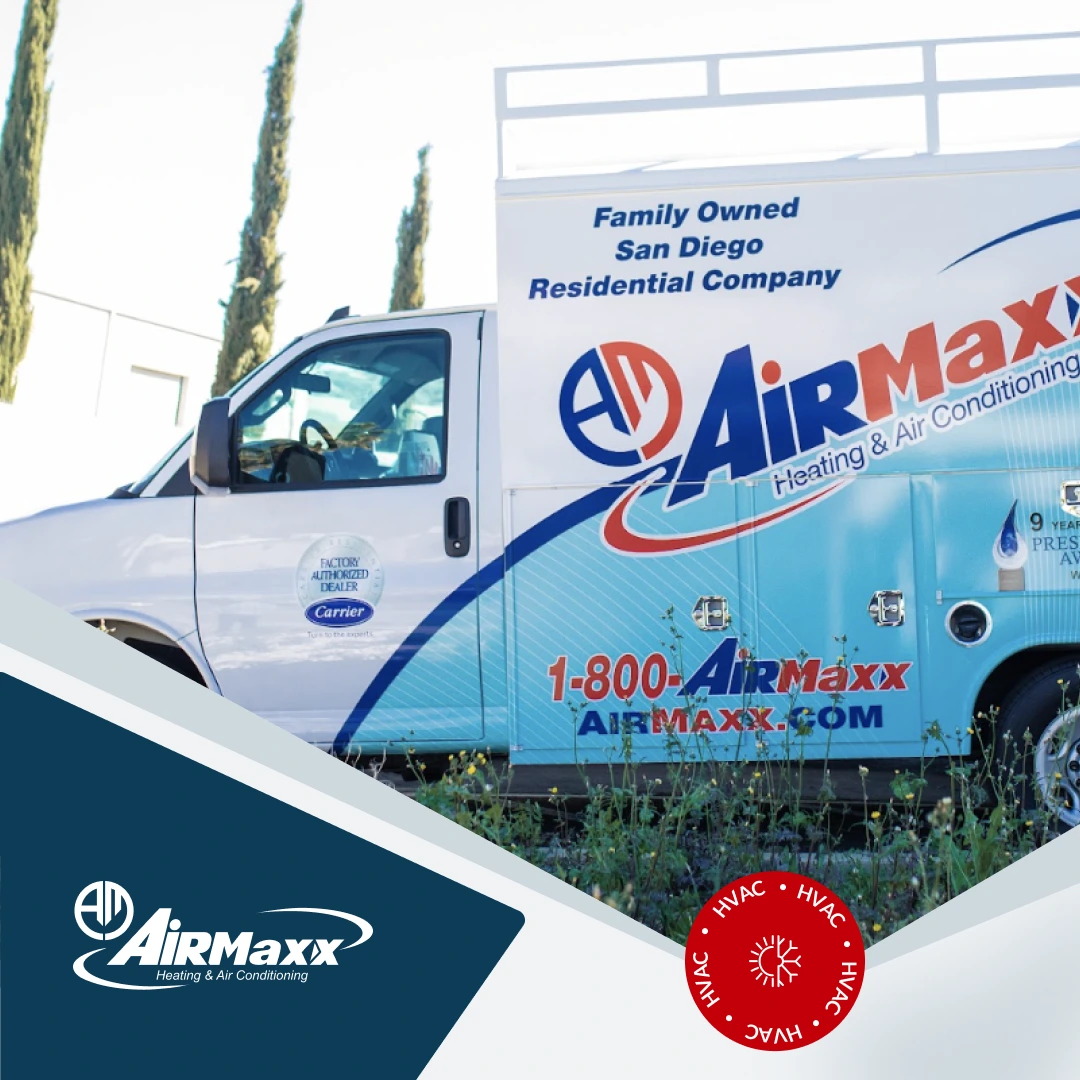People don’t tend to think much about their air conditioning system until something goes wrong. But, as with most things, preventative attention can go a long way. Of course, our Airmaxx HVAC technicians are happy to think about this stuff for you. We’re available 24 hours a day for emergency repairs if anything goes wrong with your HVAC systems. Still, a little basic knowledge can save you a lot of time and money.
The Top 12 Things Everyone Should Know About A/C:
1. A/C History 101
For many years, humans have been developing ways to avoid being hot and stuffy. Ancient Egyptians used to cool their indoor air by hanging wet mats on their doorways. Romans figured out how to run fresh water through their indoor pipes to cool their homes. Even Benjamin Franklin – the inventor whose kite experiment revealed much of what we now know about the nature of electricity – dabbled in the air conditioning world, working with colleagues to figure out how to manipulate liquids that have refrigerating properties. Despite these, and other, contributions, the invention of the first modern air conditioner in 1902 is credited by most to Willis Carrier, an American engineer.
If we fast forward over 100 years since Carrier’s invention, humans are more conscious of their comfort than ever.
2. A/C Anatomy
It’s helpful to know how the air conditioner works in the first place. This will help all other information to make sense, and will give you an enormous appreciation for the professionals whose job it is to keep your A/C in working order. The little things make a huge difference.
- Inside your A/C, there is a set of pipes filled with refrigerant, which (just as it sounds) refrigerated – or cools – the air around it. The set of pipes is also called an evaporator coil.
- Hot air from outside is pumped into your air conditioner by a blower (or fan), running the air over the cooling coils, and blowing it into your home.
- The refrigerant in the evaporator coil changes from a liquid into a gas while absorbing heat from the air.
- At the same time, the hot air inside your home is being pushed outside with another fan.
- The refrigerant is pumped outside the house to another coil (called a condenser), releasing its heat and changing back (condensing) into a liquid.
- The refrigerant is moved back and forth within the air conditioner by a pump called a compressor, which regulates the rate of movement so that the refrigeration and condensation happens within the right coil.
- Your A/C also has a motor, which runs the compressor.
3. Set The Right Temperature
As a general rule, your air conditioner can keep indoor temperatures about 20 degrees cooler than outdoors. This means that on a 100-degree day, your A/C may struggle to cool your home below 80 degrees. Setting the thermostat any lower than that will strain your unit unnecessarily, and will probably result in it constantly running in a noble attempt to reach the cooler temperature. If the heat is unbearable, try using a ceiling, table, or other type of fan to keep the air moving.
If you have a central unit, you can purchase a thermostat with a timer that can be programmed to adjust to higher temperatures when you’re gone, and cooler temperature when you’re home. It’s not a good idea to turn your unit off completely unless you’re going on vacation. Turning it off will result in the unit needing to work extra hard to cool the home at a later time.
4. Change Your Filters
If you have a central or window unit, you need to change your filters about once a month during the cooling season. In-home filters have a minimum efficiency reporting value (MERV), which is a number between 1 and 12. A higher MERV ranking means greater filtration, and it is generally recommended that you use filters of a 6 or higher.
If you’re wondering why the filters are important, here’s a quick explanation. They have a dual purpose: 1) they keep particles from accumulating on the evaporator coil, which could eventually stop the unit from working, and 2) they prevent particles from being released into the air inside your home.
The longer you keep a filter, the more particles it catches. So if you wait too long to change it, then the filter itself becomes a pollutant because it can no longer hold the new dirt being blown around. Homes located around construction or dirt roads tend to need filter changes more frequently, as well as those with pets. Filter gunk (not a scientific term) will prevent the air from flowing freely, which will prevent you from maximizing your comfort. Change your filters to keep the breeze… and keep the peace.
5. Clean Your Outdoor Condenser
Your condenser has to survive a lot being exposed to the elements throughout the year. If you notice that your unit is not cooling as well, it may be because the condenser needs cleaning. Leaves, twigs, grass, and other debris can get caught in its fins, and this will obstruct its cooling ability.
Before you get started with the cleaning, be sure to turn the condenser off. This can be done by pulling out a fuse block connecting the unit to your home, or moving the switch to the “off” position. Be sure that the temperature is at least 60 degrees outside so that you can test the air conditioner to be sure that it works.
Clean the fins by first using a soft brush attachment on your vacuum. Be careful, as the fins can bend easily if you’re too rough. If you discover that they are bent, try using a butter knife from your kitchen to push them back into shape. After vacuuming, use a hose to rinse the remainder of the debris. Remember to refer to your owner’s manual for instructions that are specific to your unit.
That takes care of the outside. Now let’s talk about the condenser’s insides.
6. Check Your Coolant Levels
The amount of refrigerant in your A/C unit is called its “charge.” If there’s a leak and the refrigerant charge goes down, you will have problems. A leak will lower your unit’s ability to work properly, and your home won’t get the cooling it needs.
Because of global warming, finding the right cooling gases to use in residential and commercial properties has been a pretty big deal. Some have been determined to be ozone-depleting substances by the Environmental Protection Agency (EPA), and are therefore banned from being used in new units. Here’s a run-down of what’s ok and what’s not:
- HCFC-22: This gas was banned in new equipment in 2010 by the EPA. It is only available for older model A/C units.
- R-410A: This is one alternative to HCFC-22, and is being used in the United States. Although it has a high global warming effect, it causes no ozone depletion.
- R-32: This gas is being evaluated by the EPA, and is known for being mildly flammable. Its global warming effect is moderate, and it causes no ozone depletion.
- Hydrocarbons: These are being used in commercial refrigeration, but not yet in homes, unless systems have been redesigned. The global warming effect is low and there is no ozone depletion.
It’s not a great idea to attempt handling any of these coolants on your own, so contact your HVAC professional if you suspect that something is amiss with your coolant levels.
7. Maximize Your A/C’s Effectiveness
Your A/C could use some help, so there are ways for you to maximize its effectiveness. Keep your blinds closed to trap cool air inside during the day. If you have a fan, run it when your A/C is on so that the cool air can circulate more freely. You should also keep all doors in the home open so that air can flow freely. If you need privacy, try to keep the door cracked.
If you have to make home repairs, such as replacing your windows or your roof, make decisions with the knowledge that insulation is everything. A home that is not well insulated will result in air leaks… which force your air conditioner to work harder than it would normally need to. Proper insulation may cost more on the front end, but over time, the savings will be significant.
Some other tricks to maximizing your air conditioner’s effectiveness include:
- Using your washer/dryer during cooler times of the day.
- On cooler nights, opening windows so that the outdoor air can fill the home.
- Making sure your ducts are sealed to prevent air leakages. You can seal them yourself with mastic – the thick, white, waterproof sealant that can be painted over them. Small ducts leaks can be sealed with foil tape.
- Keep the blinds on the west side of your home closed on hotter days.
8. Pay Attention To Efficiency Rating
Along the lines of effectiveness, efficiency matters as well. If you have a central A/C unit, check the seasonal energy-efficiency ratio, or the SEER. In a window unit, it is called the energy-efficiency ratio (EER). Your SEER should be at least a 13, and your EER should be no lower than 8. The higher the number, the less costly and more efficient the unit.
Also, purchase a unit that is a good match for your climate. If you live in a humid area, find an A/C that also dehumidifies. If you live in a dry climate, find one that will operate optimally in hot, dry temperatures. Taking the time to tailor your purchase to your specific needs will save you a lot of money and heartache in the future.
9. Get An Air Conditioning Check-Up Annually
Just like our bodies and cars need check-ups, air conditioners benefit from them as well. Be sure your professional looks at the following:
- Inspecting and cleaning coils,
- Replacing fan belts if needed,
- Checking refrigerant charge and pressures,
- Cleaning or replacing filters if you’re unable to do it,
- Lubricating motors and bearings,
- Cleaning and checking blowers and fans,
- Inspecting controls and safeties, and
- Checking temperature controls.
10. Humidity Matters More Than Heat
Humidity, if not regulated, can lead to some serious problems. Not only does it make you feel worse about the heat, but it can support the growth of mold and other bacteria that can affect the health of those living in the space. If you’ve ever noticed the condensation that can accumulate around air conditioning vents, you are aware of the dehumidifying properties that most A/C units have. They literally pull the moisture out of the air.
So that your A/C does not have to do all the work alone, be sure to use your exhaust fans when bathing, showering, and cooking. You can also use a fan to help blow some of the air outdoors. If these options aren’t working as they should, purchase a separate dehumidifier to help things along. Sticky skin is the least of your concerns when considering the dangers of mold and damp environments. It can lead to upper respiratory tract problems, coughing, wheezing and inflammation of asthma symptoms.
11. Pick A Unit That Makes Sense For You
The size of your air conditioner should be proportionate to the size of the space you want to cool off. If your A/C is too big, it may cool the space quickly, but it won’t effectively dehumidify the area. Energy Star offers a chart that will help you decide how much cooling capacity, measured in British thermal units (BTU), you will need per hour. This cooling capacity is also called “tons” – One ton of cooling equals 12,000 BTU/hour.
Another thing to consider is the perks that come along with your purchase. When negotiating prices, pay attention to whether or not the price includes a service plan, discounts on repairs, or a labor warranty. Purchasing is only he first step… maintenance soon follows.
12. Choose The Right HVAC Professional
We are proud to have world-class HVAC professionals at Airmaxx. Your contractor should be certified by an organization like the Air Conditioning Contractors of America (ACCA). When you call us, be sure to have information on hand about the brand of your A/C as well as the level of cooling and comfort you’re aiming for. Many of our customers have recommended us based on their own experiences, and we value the customer relationships we have been able to build through word-of-mouth testimonials.
Our qualified HVAC technicians will make sure you understand what’s going on, and they will patiently answer your questions to assure you that your A/C is in good hands.
A little insider knowledge can go a long way. Share what you learn, and give us a call at (619) 655-3010 if you need us. We’re available 24 hours a day.



